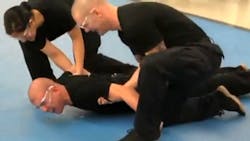Albuquerque PD to Train Officers in Crisis Intervention
The Albuquerque Police Department will increase its crisis intervention training this year to try to certify all field officers in the force, adding 10 classes this year.
The change comes after the Department of Justice recommended reforms to CIT, which is used to de-escalate tense situations with the mentally ill and others, as part of its expansive report that found officers used force unconstitutionally.
The department has a separate CIT unit that is called to some situations, but this training will not affect that unit. About 30 percent of current field officers have been trained in crisis intervention.
The DOJ has not yet specified the number of officers it wants trained in CIT, and the report emphasizes that both the CIT unit and individual officers with the training must be given more power, respect and "greater latitude" at volatile scenes.
"The availability of trained CIT officers has not kept up with the needs of the community, and de-escalation techniques employed by these officers are too easily dismissed by heavily-armed tactical units in situations where individuals under police are not posing an immediate threat of harm," the report reads.
Assistant Chief Robert Huntsman said Sunday the department is still reviewing whether CIT officers need more latitude, or more control, at scenes.
"We're looking at all of our systems and all of our units and all of our policies and procedures, and that is definitely something that we're going to look at," Huntsman said. "But I think we're going to get a good result with the officers being CIT trained. What we want to see happen is that the first officer to show up on a call with somebody in crisis or with mental illness is equipped to deal with that from start to finish."
The first class of about 30 officers begins today, and 10 are scheduled to be completed by the end of this year. The classes are 40 hours a week and include mock crisis situations performed by actors. Previously, only two classes a year were scheduled.
When asked if this training would have helped in recent officer-involved shootings, Huntsman said he didn't think it would have helped in the Mary Hawkes shooting because it happened so quickly.
He declined to comment on the James Boyd shooting, citing the FBI investigation. The crisis unit was never deployed to the hours-long standoff with Boyd, who was mentally ill and threatened officers with knives before being fatally shot by police. There was at least one CIT-trained officer at the scene.
Police psychologist Troy Rodgers, who has headed CIT training as a contractor with the city for 10 years, said the changes come because law enforcement is "evolving," but said he couldn't speak to specific cases.
"We do look at events such as shootings, and we add that to our training," Rodgers said.
Copyright 2014 - Albuquerque Journal, N.M.
McClatchy-Tribune News Service
